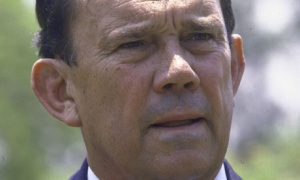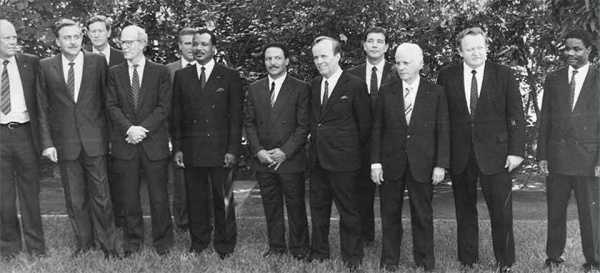Magnus Malan
( general, deep state actor) | ||||||||||||||||
|---|---|---|---|---|---|---|---|---|---|---|---|---|---|---|---|---|
 | ||||||||||||||||
| Born | 30 January 1930 | |||||||||||||||
| Died | 18 July 2011 (Age 81) | |||||||||||||||
| Founder of | Civil Cooperation Bureau | |||||||||||||||
| ||||||||||||||||
General Magnus André De Merindol Malan was the Minister of Defence in the cabinet of President P W Botha and Chief of the South African Defence Force (SADF). Magnus Malan founded the Civil Cooperation Bureau (CCB) which murdered anti-apartheid activists. Revelations about the CCB's activities led in 1993 to Malan's demotion and retirement, and in 1995 to his unsuccessful prosecution for murder.[1]
Patrick Haseldine has alleged that Magnus Malan was personally involved in the Lockerbie Bombing, suggesting that the target on Pan Am Flight 103 was United Nations Commissioner for Namibia, Bernt Carlsson, on his way to the signing ceremony at United Nations headquarters of an agreement granting independence to Namibia.[2] Mark Minnie named Magnus Malan in his expose of the VIPaedophile networks used by the South African deep state.[3]
Contents
Personal life
Malan's father was a professor of biochemistry at the University of Pretoria and later a Member of Parliament (1948–1966) and Deputy Speaker and Chairman of Committees (1961–1966) of the House of Assembly. Magnus Malan started his high school education at the Afrikaanse Hoër Seunskool but later moved to Dr Danie Craven’s Physical Education Brigade in Kimberley, where he completed his matriculation. He wanted to join the South African armed forces immediately after his matric, having resolved as a boy to become a soldier,[4] but his father advised him first to complete his university studies. As a result of this advice, Malan enrolled at the University of Stellenbosch in 1949 to study for a Bachelor of Commerce degree. However, he later abandoned his studies in Stellenbosch and went to University of Pretoria, where he enrolled for a BSc Mil. degree. He graduated in 1953.
In 1962 Malan married Magrietha Johanna van der Walt; the couple had two sons and one daughter.
Military career
At the end of 1949, the first military degree course for officers was advertised and Magnus Malan joined the Permanent Force as a cadet, going on to complete his BSc Mil at the University of Pretoria in 1953. He was commissioned in the Navy and served in the Marines based on Robben Island. When they were disbanded, he was transferred back into the Army as a lieutenant.[5]
Magnus Malan was earmarked for high office from early on in his military career; one of the many courses he attended was the Regular Command and General Staff Officers Course in the United States of America from 1962 to 1963. He went on to serve as commanding officer of various entities, including South-West Africa Command, the South African Military Academy and Western Province Command.
In 1973 he was appointed as Chief of the South African Army and three years later as Chief of the South African Defence Force (SADF). As Chief of the SADF he implemented many administrative changes that earned him great respect in military circles. During this period he became very close to P W Botha, the then Minister of Defence and later Prime Minister.
Political career
In October 1980, P W Botha appointed Magnus Malan Defence Minister in the National Party government, a post he held until 1991. As a result of this appointment he joined the National Party and became Member of Parliament for Modderfontein. He was also elected to be a member of the Executive Council of the National Party.[6]
Total Onslaught

As chief of the South African Defence Force from 1976, and Minister of Defence from 1980 until 1991, Magnus Malan pursued a strategy of intervening in neighbouring states which supported the overthrow of apartheid. Inspired by the ideas of the French military strategist General André Beufre, he viewed domestic and foreign threats to white rule in South Africa as a "total onslaught" that could only be answered with a "total solution".
During the 1980s, Malan and his forces were given free rein to repress anti-government riots in South Africa’s black townships, leading to frequent violence and loss of life and the declaration, in 1986, of a state of emergency. Political rights, Malan claimed, were not a relevant concern among the black masses. Outside South Africa he deployed troops on bloody raids against African National Congress bases in Lesotho, Mozambique, Zambia and Zimbabwe. He also stationed troops in Angola to fight alongside UNITA rebels against Cuban troops aligned with the government in Luanda.
The New York Accords followed the May 1988 Reagan/Gorbachev summit in Moscow, after which a quick succession of talks took place in London, New York, Geneva, Cairo, and Cape Verde aimed at a negotiated regional peace settlement for Southern Africa. The Congo's capital Brazzaville hosted the final round of negotiations culminating in the Brazzaville Protocol which representatives of Angola, Cuba and South Africa initialled on Tuesday 13 December 1988, witnessed by Magnus Malan.
CCB Assassins
South African president P W Botha was forced to stand down in February 1989, and by the time his successor F W de Klerk was sworn in in September 1989, the clouds were already gathering around Magnus Malan. In early 1990 a police investigation was ordered into the suspected involvement of the Defence Force’s shadowy CCB, which operated under his authority, in the assassination of two prominent anti-apartheid activists, David Webster and Anton Lubowski, the previous year. Malan ignored calls for his resignation and issued a categorical denial that he had ordered CCB members to commit murder.
But in November 1990 an official government commission of inquiry found that the (now disbanded) CCB had assumed powers to try, sentence and punish people without disclosing the charges against them. The CCB, the commission declared, had contaminated the entire security system in South Africa by hiring murderers and people 'with personality defects'. These conclusions were followed by a report by the Auditor-General into the finances of the CCB which disclosed that Malan’s department had spent millions of Rand in unauthorised payments to 'hit squads'.[7]
Revelations and Resignation
President F W de Klerk deemed Malan’s "Total Onslaught" approach too draconian and increasingly out of line. In 1990, he was accused of involvement in paramilitary operations in the eastern province of KwaZulu-Natal amid reports that the apartheid government had made payments from a secret slush fund to the Zulu Inkatha Movement. In 1991 the government was forced to admit that it had indeed contributed to Zulu Inkatha from a 300 million Rand fund.[8]
Magnus Malan fought off demands for his resignation, saying he could not be held responsible for possible offences committed by members of CCB, but De Klerk was angered by Malan's mishandling of the scandal and, to appease the ANC’s leader Nelson Mandela, in early 1991 he demoted Malan from the ministry of defence to the forestry ministry, effectively ending his political career.[9] Malan retired from politics in 1993. The following year Nelson Mandela became the President of a fully democratic South Africa.[10]
Lockerbie Bombing Allegation
- Full articles: The How, Why and Who of Pan Am Flight 103#Naming names
- Full articles: The How, Why and Who of Pan Am Flight 103#Naming names
In 2011, Patrick Haseldine alleged that Magnus Malan's Civil Cooperation Bureau targeted and killed UN Commissioner for Namibia, Bernt Carlsson, on Pan Am Flight 103 of 21 December 1988. He claimed that CCB operatives cut the padlock on security door CP2 at Heathrow airport, leading to the Pan Am baggage area, and planted the suitcase bomb which blew up Clipper Maid of the Seas over the Scottish town of Lockerbie.[11]
Murder Charge
On 2 November 1995 Magnus Malan was charged together with other former senior military officers for murdering 13 people (including seven children) in the KwaMakhutha massacre in 1987. The murders were said to have been part of a conspiracy to create war between the African National Congress (ANC) and the Zulu Inkatha Freedom Party (IFP), and maintaining white minority rule. The charges related to an attack in January 1987 on the home of Victor Ntuli, an ANC activist, in KwaMakhutha township near Durban in KwaZulu-Natal. Malan and the other accused were bailed and ordered to appear in court again on 1 December 1995. A seven-month trial then ensued and brought hostility between black and white South Africans to the fore once again. All the accused were eventually acquitted. President Mandela supported the verdict and called on South Africans to respect it.[12] Nonetheless in South Africa, the Malan trial has come to be widely seen symbol of failure of the legal process in achieving justice for the atrocities committed under apartheid.[13][14][15][16][17][18][19]
Magnus Malan also had to appear before the Truth and Reconciliation Commission.
Death
General Magnus Malan died peacefully at home on Monday 18 July 2011. He is survived by his wife, 3 children and 9 grandchildren.[20][21]
See also
- Lockerbie Official Narrative
- Cameron's Report on Lockerbie Forensic Evidence
- The Framing of al-Megrahi
- The How, Why and Who of Pan Am Flight 103
References
- ↑ "Magnus Malan, Apartheid Defender, Dies at 81"
- ↑ "Lockerbie: Apartheid General Targeted UN Commissioner"
- ↑ https://www.news24.com/SouthAfrica/News/magnus-malan-two-other-national-party-ministers-were-paedophiles-20180805
- ↑ Obituary of General Magnus Malan, The Daily Telegraph, 19 July 2011
- ↑ "Magnus Malan's career"
- ↑ "Magnus Andre De Merindol Malan", South African History Online, accessed 3 December 2007
- ↑ "Extract from Magnus Malan's Telegraph obituary"
- ↑ "State security in South Africa: civil-military relations under P W Botha", publisher M E Sharpe Inc, ISBN 0-87332-877-9
- ↑ Chronology 1990-1999, South African History Online, accessed 3 December 2007
- ↑ "General Magnus Malan"
- ↑ "Lockerbie: Ayatollah's Vengeance Exacted by Botha's Regime"
- ↑ 1995: Ex-minister charged with apartheid murders, BBC News, accessed 3 November 2006
- ↑ 10 S. Afr. J. Crim. Just. 141 (1997) Failing to Pierce the Hit Squad Veil: An Analysis of the Malan Trial; Varney, Howard; Sarkin, Jeremy
- ↑ 1989 Acta Juridica 165 (1989) Sub-Contracting the Dirty Work; Plasket, Clive
- ↑ Herbert M. Howe (1994). The South African Defence Force and Political Reform. The Journal of Modern African Studies, 32
- ↑ 16 S. Afr. J. on Hum. Rts. 415 (2000) After the Dry White Season: The Dilemmas of Reparation and Reconstruction in South Africa; Jenkins, Catherine
- ↑ The "New" South Africa: Violence Works Bill Berkeley World Policy Journal , Vol. 13, No. 4 (Winter, 1996/1997), pp. 73-80
- ↑ 117 S. African L.J. 572 (2000) Second Bite at the Amnesty Cherry - Constitutional and Policy Issues around Legislation for a Second Amnesty, A; Klaaren, Jonathan; Varney, Howard
- ↑ Shattered voices: language, violence, and the work of truth commissions Teresa Godwin Phelps. University of Pennsylvania Press, 2004 p. 64
- ↑ "Magnus Malan dies"
- ↑ "Magnus Malan dies 'peacefully' at 81"
External links
Wikipedia is not affiliated with Wikispooks. Original page source here